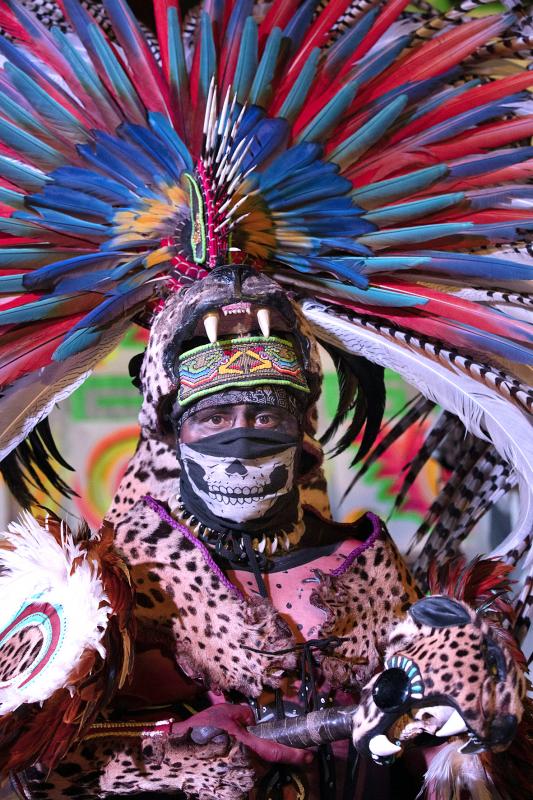A disconsolate mother dressed in white wanders through Mexico City’s floating gardens looking for her children killed by COVID-19, in a pandemic-era adaptation of a legend rooted in Aztec mythology.
The traditional play La Llorona (The Weeping Woman) returns to the UNESCO World Heritage Site of Xochimilco ahead of the Day of the Dead with a poignant tribute to the victims of COVID-19.
The ghost with flowing black hair, who according to legend reappears every year searching for her downed children, has spread throughout Latin America.

Photo: AP
“It’s dedicated to the memory of all the people who left without saying goodbye to their loved ones and for all the families who have suffered this loss,” Nayeli Cortes, who has played the role of the weeping mother for 11 years, said.
Measures such as face masks made of transparent plastic or cloth and a smaller audience enabled the 27-year-old performance and its flamboyant costumes to survive the pandemic.
COVID-19 has killed 86,000 people in Mexico, one of the world’s highest tolls, and as in other countries kept people apart from their families.
“Not being able to hug, hold hands or kiss (relatives) is very frustrating and that’s why right now it’s dedicated to them,” said stage director Maria Luisa Castillo.
“We know that they are here with us and it is the homage that we can give them, and also to tell them, ‘Here we are. We remember you. You will never be forgotten.’”
According to experts, the legend of the wandering ghost was first documented around 1550. It is associated with supposed dire omens prior to the Spanish conquest that predicted the end of the Tenochtitlan empire 500 years ago.
The audience watched the show from the gondolas that ply the canals of Xochimilco, which usually attracts about a million tourists a year but was shut for almost six months due to the pandemic.
Hugo Cruz, a 46-year-old driver, said that it was important to keep the legend alive for future generations.
“If we don’t instill (the traditions) in our children then it’s going to be lost,” he said. “I think that we’re the only country that worships death in this way.”
The Day of the Dead, celebrated in Mexico on the first two days of November, is believed to be when the gateway separating the living and the deceased opens.
This year the festival known for its bright colors and elaborate costumes will be a more subdued, scaled down affair due to the pandemic.

Climate change, political headwinds and diverging market dynamics around the world have pushed coffee prices to fresh records, jacking up the cost of your everyday brew or a barista’s signature macchiato. While the current hot streak may calm down in the coming months, experts and industry insiders expect volatility will remain the watchword, giving little visibility for producers — two-thirds of whom farm parcels of less than one hectare. METEORIC RISE The price of arabica beans listed in New York surged by 90 percent last year, smashing on Dec. 10 a record dating from 1977 — US$3.48 per pound. Robusta prices have

A dozen excited 10-year-olds are bouncing in their chairs. The small classroom’s walls are lined with racks of wetsuits and water equipment, and decorated with posters of turtles. But the students’ eyes are trained on their teacher, Tseng Ching-ming, describing the currents and sea conditions at nearby Banana Bay, where they’ll soon be going. “Today you have one mission: to take off your equipment and float in the water,” he says. Some of the kids grin, nervously. They don’t know it, but the students from Kenting-Eluan elementary school on Taiwan’s southernmost point, are rare among their peers and predecessors. Despite most of

The resignation of Taiwan People’s Party (TPP) co-founder Ko Wen-je (柯文哲) as party chair on Jan. 1 has led to an interesting battle between two leading party figures, Huang Kuo-chang (黃國昌) and Tsai Pi-ru (蔡壁如). For years the party has been a one-man show, but with Ko being held incommunicado while on trial for corruption, the new chair’s leadership could be make or break for the young party. Not only are the two very different in style, their backgrounds are very different. Tsai is a co-founder of the TPP and has been with Ko from the very beginning. Huang has

A few years ago, getting a visa to visit China was a “ball ache,” says Kate Murray. The Australian was going for a four-day trade show, but the visa required a formal invitation from the organizers and what felt like “a thousand forms.” “They wanted so many details about your life and personal life,” she tells the Guardian. “The paperwork was bonkers.” But were she to go back again now, Murray could just jump on the plane. Australians are among citizens of almost 40 countries for which China now waives visas for business, tourism or family visits for up to four weeks. It’s